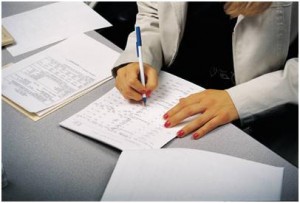Preparing a Resume or CV
A Resume or Curriculum Vitae (CV) is a marketing document of you. It summarises your personal and professional skills and qualities as demonstrated through your educational qualifications, work experience (paid and voluntary) sporting, community and leisure interests.
qualities as demonstrated through your educational qualifications, work experience (paid and voluntary) sporting, community and leisure interests.
The content of your Resume/CV may vary depending on the job for which you are applying. For example, if the selection process involves addressing selection criteria, you should not provide too much detail in your Resume/CV (that comes in your statement addressing the selection criteria). However, if the process only requires a Resume/CV, you would then concentrate on your Resume/CV and make it as detailed as possible, bearing in mind the job position’s requirements (please note, detail does not equal lots of pages – aim for a length of no more than 2-3 pages).
The following information is a guide to preparing a Resume/CV. You will need to make your own judgement as to what you include and what you don”t.
How should I prepare to write my Resume/CV
- Define who you are and what you have to offer the employer.
- Develop an inventory of your skills, experiences and achievement.
- Identify situations where you have demonstrated these skills.
- Research the employer (eg, Brochures, website, annual reports, other publications, talk with the contact person either face to face or on the phone).
- Analyse the employer’s needs, job description, competency information etc.
How should I present my Resume/CV
- Use good quality plain A4 paper.
- Type your Resume/CV and use a high quality printer.
- Use a layout that ensures information can be quickly and easily read (eg, use headings and sub-headings)
- Keep headings and sub-headings consistend in style and size.
- Avoid small print.
- Number pages and have your name and contact information on the top of each page so the reader always know who’s application they are reading.
- Be concise and aim for a length of now more than 2-3 pages.
What should I include in a Resume/CV
- Personal Details: Name, Address and all Contact details (eg, home telephone, mobile, email – remember you want the prospective employer to find you for that interview).
- Educational Qualifications: List the universities, colleges and schools that you have attended outlingin the years attended and levels attained – also highlighting any majors, research projects and special achievements (eg, BBus Mgt Queensland University of Technology 1993; Cert IV Financial Management – Bookkeeping 2010)
- Professional Memberships: List your professional memberships and how long you have held these memberships (eg, Fello, Australian Institute of Management 1999 to date). Also any positions you have held in realtion to professional organisations (eg, Public Sector Committee, CPA Australia Qld, 2000-2008).
- Seminars, Training and Development: List seminars, training and development activities you have successfully completed throughout your career, in reverse order and note any accreditations and formal recognition of competency form this development (eg, Accredited Train the Trainer 2009).
- Key Competencies relevant to the Job: Outline the key skills and abilities (ie, competencies) that you possess which directly relate to the position for which you are applying. For example, for a bookkeeping position, key competencies would include bookkeeping knowledge and bookkeeping software knowledge and experience. You would list these two competencies as headings and then briefly outline the level of competency in relation to them (eg, years of experience, certificates in MYOB etc, key achievements in previous employment).
- Employment History: List all positions held in reverse order (ie, most recent employment first). Information on each position should include the dates you held each position, the title of each position held, the name of the employer, as well as, responsibilities and skills employed in each position. Further, list any major achievements or projects you achieved or undertook whilst in each role.
- Interests and Extra Activities: List your interests and activities particularly those which relate to your ability to meet the requirements of the job (note – this is not an integral part of the selection process however, it can demonstrate skills further, for example, if you play team sports it is telling the employer you may work well in teams).
- Referees: List 2-3 referees – make sure they are reasonably current and immediate past employers and/or supervisors (if for some reason you do not wish to list your current employer, then it is advisable to list someone from the organisation who has a good understanding of your comptency and capability). Personal referees should only be used if you do not have any relevant or appropriate work referees. Referees should be able to comment on how you can persform in relation to the selection criteria. Include the referee’s name, address and contact details. It is a good idea to ask the person if they would be a referee for you and to show them what you have in relation to the job you are applying for as well as discuss their reference (you don’t want any surprises).

